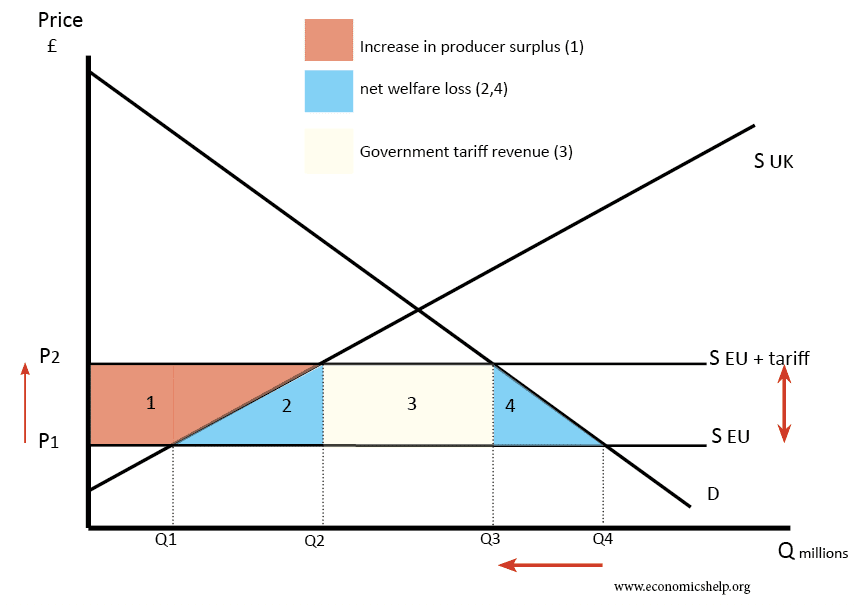Post-Brexit Challenges For UK Luxury Exports To The EU

Table of Contents
Increased Bureaucracy and Administrative Costs
Post-Brexit, UK luxury exporters face a dramatically increased administrative burden, impacting both time and profitability. This increased bureaucracy manifests in two primary areas: customs procedures and VAT/duty implications.
Customs Procedures and Delays
Increased paperwork, customs declarations, and inspections are leading to significant delays and added costs for luxury goods shipments. These delays are particularly problematic for time-sensitive goods and can severely damage brand reputation.
- Longer transit times: Goods spend more time in transit, increasing storage costs and potentially impacting product quality.
- Increased storage costs: Delays often necessitate increased warehousing fees, further eroding profit margins.
- Risk of spoilage: Perishable luxury items, such as high-end cosmetics or chocolates, are at increased risk of spoilage due to extended transit times.
- Complex customs regulations: Navigating the intricacies of EU customs regulations requires specialized knowledge and often necessitates the use of customs brokers, adding to the overall cost.
For example, a delay of even a few days can mean the difference between a satisfied customer receiving a high-value watch on time for a special occasion and a severely damaged customer relationship.
VAT and Duty Implications
New VAT and duty regulations have added significant complexity and compliance costs. Understanding and adhering to these regulations is crucial to avoid penalties and maintain a positive brand image.
- Differing VAT rates: VAT rates vary across EU member states, requiring careful calculation and accurate declaration for each shipment.
- Complex import/export procedures: The process of declaring goods for import into the EU is significantly more complex than before Brexit.
- Increased financial liabilities: Incorrect declarations can result in hefty fines and penalties, potentially crippling smaller businesses.
For instance, an incorrect VAT declaration can lead to substantial financial penalties and severely damage a luxury brand's reputation for meticulous attention to detail.
Non-Tariff Barriers and Trade Friction
Beyond increased paperwork, UK luxury exporters face significant non-tariff barriers that hinder smooth trade with the EU.
Sanitary and Phytosanitary (SPS) Regulations
Stricter SPS checks for food and drink, and even certain non-food luxury goods requiring specific certifications, create further delays and costs.
- Specific certifications and licenses: Many luxury goods require specific certifications and licenses to meet EU standards, adding time and expense to the export process.
- Increased inspection frequency: Increased scrutiny at border crossings results in longer processing times and potential delays.
- Potential rejections due to non-compliance: Failure to meet EU SPS standards can lead to shipment rejection, resulting in significant financial losses and reputational damage.
For example, a shipment of high-end Scottish whisky could face delays or rejection if it doesn't meet stringent EU labeling requirements, potentially missing a crucial seasonal sales window.
Rules of Origin
Demonstrating that goods meet the UK's rules of origin for preferential trade access within the EU is crucial but incredibly challenging.
- Detailed record-keeping: Maintaining comprehensive records detailing the origin of all components is essential for proving compliance.
- Complex supply chains: Tracking the origin of components through complex international supply chains adds significant administrative complexity.
- Penalties for non-compliance: Failure to prove origin correctly can result in the loss of preferential tariff treatment and significant financial penalties.
Luxury handbags, for instance, often use components sourced from various countries, making it exceptionally difficult to prove origin and access favourable tariff treatments.
Impact on Supply Chains and Logistics
Brexit has significantly disrupted UK luxury export supply chains and logistics, impacting costs and efficiency.
Increased Transportation Costs
Brexit has led to a noticeable increase in transportation costs and logistical complexities, reducing profit margins.
- Higher shipping fees: Increased customs processing and border controls contribute to higher shipping fees.
- Increased insurance costs: The increased risk of delays and disruptions has led to higher insurance premiums.
- Complex route planning: Careful route planning is now essential to navigate new customs checks and border controls, adding to logistical costs.
The need for specialized transportation providers experienced in handling sensitive luxury goods adds significantly to the overall cost.
Workforce Shortages and Skills Gaps
Brexit has also impacted the availability of skilled workers in logistics and customs, affecting the efficiency of the export process.
- Difficulty in hiring: Finding staff with expertise in EU trade regulations is increasingly difficult.
- Reliance on external consultants: Businesses are often forced to rely on expensive external consultants to navigate the complexities of post-Brexit trade.
A lack of skilled customs brokers, for example, can delay shipments and create costly bottlenecks, significantly impacting profitability.
Conclusion
Post-Brexit challenges for UK luxury exports to the EU are multifaceted, encompassing increased bureaucracy, non-tariff barriers, and disruptions to supply chains. Navigating these complexities requires strategic planning, investment in compliance expertise, and a thorough understanding of EU regulations. Ignoring these challenges could severely impact the competitiveness of UK luxury brands in the European market. Understanding the intricacies of post-Brexit UK luxury exports to the EU is vital for maintaining market access and long-term success. Businesses need to proactively address these issues to ensure the continued prosperity of the UK’s luxury goods sector in the European market. Seek professional advice to effectively manage the complexities of post-Brexit UK luxury exports to the EU and secure your market share.

Featured Posts
-
 Nou Membru In Familia Schumacher Legendarul Pilot A Devenit Bunic
May 20, 2025
Nou Membru In Familia Schumacher Legendarul Pilot A Devenit Bunic
May 20, 2025 -
 Schumacher La Separacion De Mick Y Su Busqueda Del Amor En Aplicacion De Citas Online
May 20, 2025
Schumacher La Separacion De Mick Y Su Busqueda Del Amor En Aplicacion De Citas Online
May 20, 2025 -
 Aryna Sabalenkas Dominant Victory Sends Her To Madrid Open Last 16
May 20, 2025
Aryna Sabalenkas Dominant Victory Sends Her To Madrid Open Last 16
May 20, 2025 -
 Michael Strahan And Good Morning America Understanding His Unexpected Departure
May 20, 2025
Michael Strahan And Good Morning America Understanding His Unexpected Departure
May 20, 2025 -
 Buy Canadian Beauty A Look At The Impact Of Tariffs
May 20, 2025
Buy Canadian Beauty A Look At The Impact Of Tariffs
May 20, 2025
Latest Posts
-
 High Ranking Admirals Corruption Trial Verdict And Implications
May 20, 2025
High Ranking Admirals Corruption Trial Verdict And Implications
May 20, 2025 -
 Bribery Prosecution Of Four Star Admiral Uncovering Deep Rooted Navy Cultural Issues
May 20, 2025
Bribery Prosecution Of Four Star Admiral Uncovering Deep Rooted Navy Cultural Issues
May 20, 2025 -
 Us Four Star Admiral Found Guilty On Corruption Charges
May 20, 2025
Us Four Star Admiral Found Guilty On Corruption Charges
May 20, 2025 -
 Four Star Admiral Convicted Unprecedented Corruption Case
May 20, 2025
Four Star Admiral Convicted Unprecedented Corruption Case
May 20, 2025 -
 Job Exchange Scheme Navys Burke Pleads Guilty To Bribery Charges
May 20, 2025
Job Exchange Scheme Navys Burke Pleads Guilty To Bribery Charges
May 20, 2025
